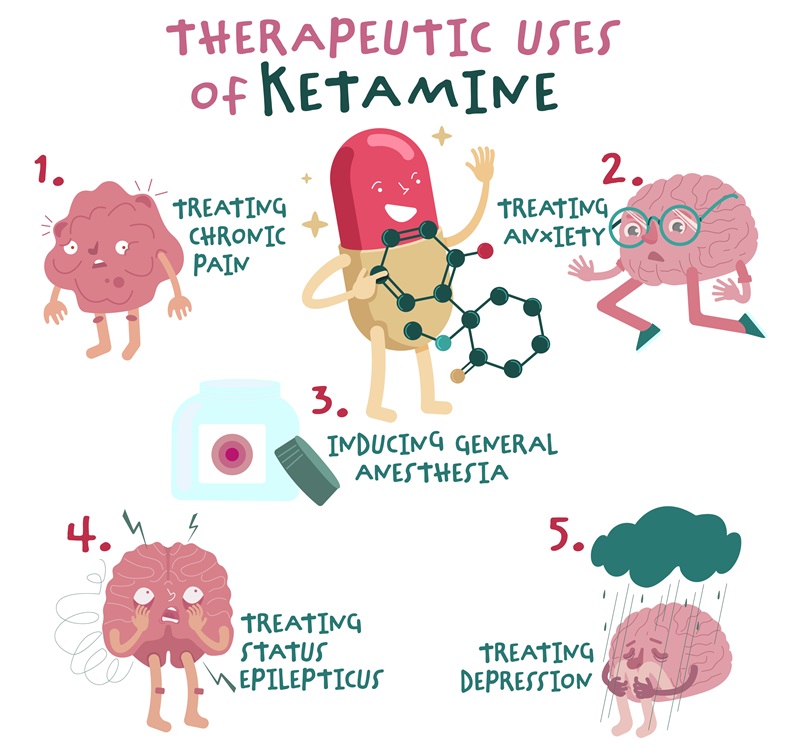Ketamine-Assisted Psychotherapy: A New Hope for Anxiety and PTSD

Ketamine-assisted psychotherapy is a therapeutic approach that combines the administration of ketamine with traditional psychotherapy techniques. The therapeutic effects of ketamine-assisted psychotherapy extend beyond its psychedelic properties, encompassing a complex interplay of neurobiological, psychological, and emotional processes. Ketamine-assisted psychotherapy combines the use of ketamine with psychotherapeutic techniques to address a variety of mental health conditions like anxiety and PTSD.
Ketamine has been found to have rapid-acting antidepressant and anti-anxiety properties at lower, sub-anesthetic doses. Ketamine-assisted psychotherapy leverages these effects to enhance the therapeutic process and help individuals address various mental health issues. Post-traumatic stress disorder, also called PTSD, is a severe condition that can occur because of experiencing or witnessing extremely stressful and terrifying events. This can also trigger anxiety, even if the person doesn’t already suffer from anxiety. The medical community has long been trying to find different and more advanced ways to treat PTSD. Ketamine-assisted psychotherapy has shown promise in helping individuals with PTSD and anxiety. Here’s how this therapy can be effective for these conditions:
- Reduction of Symptoms –
- Anxiety Reduction: Ketamine can reduce symptoms of anxiety, including panic attacks, generalized anxiety, and social anxiety, providing a calmer mental state that is more conducive to therapy.
- PTSD Symptom Relief: Ketamine can help alleviate PTSD symptoms such as flashbacks, nightmares, hypervigilance, and emotional numbness.
- Emotional Processing –
- Enhanced Introspection: Ketamine can facilitate a state of heightened introspection, allowing individuals to process traumatic memories and emotions more effectively during therapy sessions.
- Emotional Release: The dissociative effects of ketamine can create a safe psychological distance from traumatic memories, enabling individuals to confront and work through these experiences without being overwhelmed.
- Reduction of Avoidance Behaviors –
- Approaching Trauma: Individuals with PTSD often avoid reminders of their trauma. Ketamine can reduce this avoidance behavior, making it easier for them to engage in therapeutic activities such as exposure therapy.
- Improvement in Mood –
- Mood Stabilization: Ketamine’s antidepressant effects can improve overall mood, reducing the emotional burden of PTSD and anxiety and increasing the effectiveness of psychotherapy.
- Cognitive Flexibility –
- New Perspectives: Enhanced neuroplasticity and cognitive flexibility can help individuals reframe negative thoughts and beliefs associated with PTSD and anxiety, fostering more adaptive thinking patterns.
Men and women alike who receive ketamine-assisted psychotherapy for PTSD often describe the treatment as a relaxing experience. When given at low, controlled doses, even the first of your series of ketamine treatments can immediately alleviate your PTSD symptoms. Terri utilizes the sublingual route when using ketamine. Sublingual ketamine is the administration of ketamine by placing it under the tongue, where it is absorbed through the mucous membranes and enters the bloodstream. During the session, Terri guides the patient through a therapeutic experience involving techniques such as mindfulness, introspection, imagery, and verbal processing to explore and address underlying emotional issues.
Take Charge Inc. firmly believes that Ketamine-assisted psychotherapy offers a promising approach to treating anxiety and PTSD. It not only provides rapid relief of symptoms but also delivers significantly long-lasting therapeutic benefits. This assurance of long-term relief can instill confidence in the effectiveness of ketamine-assisted psychotherapy. Contact Terri Dichiser, owner of Take Charge Inc., at (913) 239-8255 to discuss your options today.
